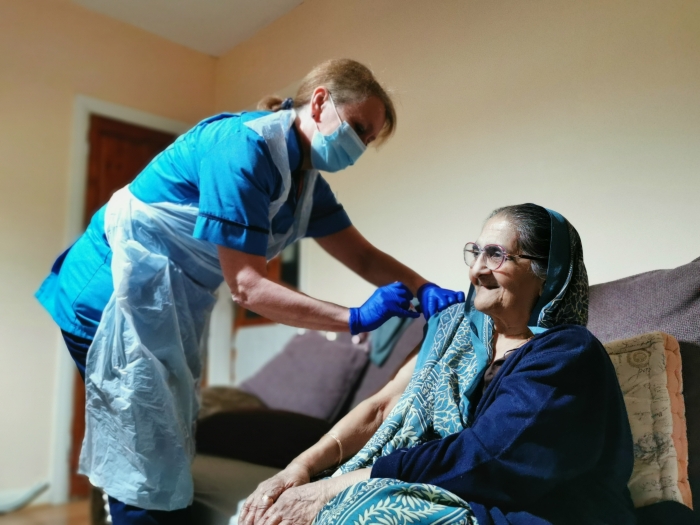A doctor or specialist nurse may prescribe 'just in case medicines' for someone who is ill. These are prescribed in case the person develops symptoms in the future, so they can be given quickly. On this page, you can read about what just in case medicines are, how they should be stored, and what to do if the person you look after needs more medicine.
Just in case medicines are medicines that can be given quickly if someone has sudden distressing symptoms, such as pain or agitation. They are also used if someone suddenly cannot take their medicines by mouth (orally) anymore.
A doctor or specialist nurse can prescribe just in case medicines for people who are ill and living at home or in a care home. Just in case medicines are also called anticipatory medicines or end of life medicines.
There are four main classes of anticipatory medication:
- Analgesia - for pain.
- Anti-emetic - for nausea and vomiting.
- Anxiolytic - for agitation.
- Anti-secretory - for respiratory secretions.
Just in case medicines are used for different symptoms, including:
- feeling and being sick (nausea and vomiting)
- breathlessness
- agitation or restlessness
- pain
- noisy breathing.
Some people have these symptoms in their last weeks and days of life, but not everyone does. Just in case medicines are prescribed in case someone develops these symptoms. It means they can access the medicines as soon as they need them.
 A doctor or specialist nurse will prescribe the medicines before the person needs them. That means the person will be able to have them more quickly if they do need them.
A doctor or specialist nurse will prescribe the medicines before the person needs them. That means the person will be able to have them more quickly if they do need them.
If the person you look after develops distressing symptoms, call their GP, specialist nurse or district nurse. In most cases, they will come to the house and give them the medicines. If they cannot visit, they will tell you if you need to do anything. You may be asked to give the person their medicine if you're able to; the doctor or nurse will guide you through this, but tell them if you do not feel able to do this.
You'll usually be given medicines in the least disturbing way possible. This means they'll be given in a way that causes the least amount of discomfort, pain or distress.
The first step is to take them by mouth (orally). If taking medicine by mouth is not possible, for example if you're being sick or cannot swallow, you can have painkillers:
- through an injection under the skin (subcutaneous)
- through an injection into the muscle (intramuscular)
- directly into a vein (intravenous)
Sometimes a small battery-operated pump, called a syringe driver, is used to give medicine continuously under the skin for a period of time, such as 24 hours. You might be offered a syringe driver if you cannot take medicine by mouth, for example if you are being sick or having difficulty swallowing.
There are also some strong painkillers that can be given through a patch on the skin.
Sometimes supplementary (adjuvant) painkillers are used alongside non-opioid and opioid painkillers. Adjuvants include medicines designed for other conditions, such as epilepsy, but work well with certain types of pain, such as nerve pain.
Side effects
Some medicines can have side effects, such as making you feel drowsy or sick. Talk to your doctor, nurse or palliative care team, who can help with managing these side effects.
You can also read national NHS advice on managing pain and common side effects here.
 The person you look after will be given medicines, as well as the equipment needed to administer them, like syringes or needles. These can be stored together in a 'just in case box'.
The person you look after will be given medicines, as well as the equipment needed to administer them, like syringes or needles. These can be stored together in a 'just in case box'.
It's important to store medicines safely:
- Keep them out of the reach or sight of children.
- Store in a cool, dry place, away from direct heat and light.
- Some medicines need to be stored in the fridge - you'll be told if this is the case.
- Ask a pharmacist if you're unsure about anything.
The GP will usually prescribe enough medicines to last a few days. If they are needed for longer, the GP or specialist nurse will usually review the person within a couple of days and prescribe more if needed. If the person you care for needs more medicines, you'll usually need to get a prescription from their GP and collect the medicines from their pharmacy.
Not all pharmacies stock just in case medicines. It's useful to find out which pharmacies in your area stock them, to save time when you get the prescription. Ask the GP or district nurse which pharmacies stock them in your area. If your pharmacy does not have the person's medication they can order it. This might take a bit longer.
Getting medication if you cannot leave your home
You might not be able to go to the pharmacy if you're not well.
Whatever your situation, you can still get the medication you need. You might have a family member, friend, neighbour or community volunteer who can help. The pharmacy might also be able to deliver your medication.